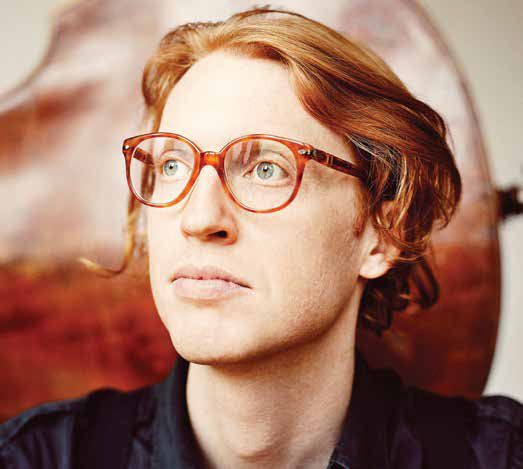Spotlight: Richard Reed Parry

“It was never my goal to play in a rock band for a living,” Richard Reed Parry admits with a laugh. To be fair, Parry isn’t just a multi-instrumentalist in any run-of-the-mill rock band—he is a core member of Arcade Fire, a Grammy-winning, arena-rocking, genre-defying outfit that just wrapped up a wildly successful tour behind 2013’s chart-topping Reflektor.
Now, with the band on a bit of a break, Parry has traded in the raucous concert fields of Glastonbury and Coachella for a more intimate setting with his compositional debut, Music for Heart and Breath, utilizing stethoscopes and other equipment to allow the musicians’ heartbeats and breathing patterns to shape the pieces.
Parry actually laid the seeds for this project long before he helped define modern indie rock with the Butler brothers. As a student at Montreal’s Concordia University back in the late ‘90s, he studied electroacoustic composition and contemporary dance.
“[Electroacoustic music] was a really interesting thing to study and, a lot of the time, the music just wasn’t something that resonated for me the way that other music did. A lot of it was really cerebral to a level where I didn’t feel any physical impact when I listened to it,” he explains. This disconnect led Parry to wonder what was on the other side of the spectrum and what music would sound like if it was fueled by that physical impact.
“I was always thinking about the relationship between music, movement and sound, and different ways to compose music for dance and create different relationships between the two things,” he says. “I was doing these sound experiments and thinking about different ways in which to compose music with a real specific idea behind it that could achieve an exciting result. At one point, my mind wandered to this idea of ‘What if you used the uncontrollable parts of the human body to control the music?’”
While it would take a few years for Parry to follow up on this concept, he found inspiration in compositions by the likes of John Cage, Steve Reich and other contemporary classical stalwarts. Then, he started writing. The result was “Duet for Heart and Breath,” the penultimate track on the album. “I didn’t change any- thing,” Parry says. “I was just so pleased and so excited with the result. I thought it really does what I want it to do and has this organic, extra-human quality about it that you can’t quite put your finger on but you really feel it.”
Invigorated by the first take, Parry enlisted some of his closest pals and longtime collaborators to take part in his experiment, namely Bryce and Aaron Dessner of The National. “[They] are both two of my favorite people and favorite musicians as guitarists and as collaborative, creative writers and thinkers,” Parry gushes. “We’re always looking for excuses to work together.” Arcade Fire took The National out for an extended tour in 2007, and Parry helped the group on their 2010 effort High Violet, adding double bass, guitar and vocals to tracks like “Vanderlyle Crybaby Geeks” and “Conversation 16.” Bryce serves as Music for Heart and Breath‘s producer and will accompany Parry on the road in support of their new project. Both Bryce and Aaron also appear on “VII Freeform Winds/String Drones.”
Blurring even more genre lines, Parry and Dessner opened up for Phish’s Trey Anastasio when his orchestral tour stopped at the Hollywood Bowl this past September. “[Anastasio] is a total genius,” Parry says. “It’s related in terms of someone trying something different and deciding they’re going to switch up their tool kit, open up their aesthetic and ignore some of the perceived boundaries around their musical world. I feel like there is a real kinship there.”
San Francisco-based virtuoso ensemble the Kronos Quartet also lent their expertise to the sessions and are a group, as Parry says, that “needs no introduction.” The guitarist’s gratitude toward them is evident almost immediately. “I’m sure I wouldn’t be writing for Kronos Quartet in the first place if it wasn’t for Kronos Quartet,” he says. “I’m sure I wouldn’t be writing or composing for anybody in a lot of ways in the first place if it wasn’t for Kronos Quartet.”
The uniqueness of the methodology—one that Parry describes as “cumbersome” and “kind of annoying”—furthers his appreciation for a group like Kronos Quartet for being so open-minded to a new way of performing and recording. “To have someone of that skill level and stature, to have them willing and able and happy to premiere this piece for me and record it, I feel so incredibly fortuitous—and the recording turned out beautifully because they’re just so great at what they do,” he says.
Parry also takes time to praise yMusic, a New York City-based sextet that contributed to Beck’s Song Reader compilation and has previously collaborated and recorded with Paul Simon, Bon Iver, David Byrne and yes, The National. “They’re all such beautiful, beautiful players,” Parry says.
The intimacy of Music for Heart and Breath sticks out almost immediately. Fans of “Wake Up” and “Rebellion (Lies)” will find a different side of the man who is responsible for much of Arcade Fire’s impenetrable muscle. “I’m always trying to maintain a musical balance,” Parry explains when describing the tone of this record compared to his work with Arcade Fire. “To get to do this thing that is so fragile, so quiet and so intimate, it’s really important to me. It’s really essential for me.”



















